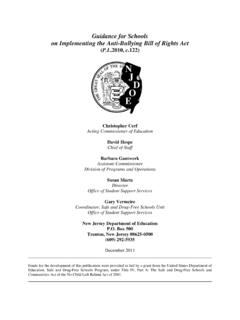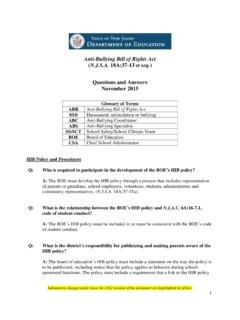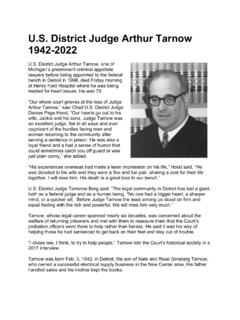Transcription of Independent Parliamentary Inquiry into Stalking Law Reform
1 Independent ParliamentaryInquiry into Stalking LawReformMain Findings andRecommendationsJustice Unions Parliamentary GroupChair: Rt Hon Elfyn Llwyd MPFebruary 2012 Advisors to the Inquiry :Laura Richards, Protection Against Fletcher, Napo the Family Court and Probation Trade :Delyth Jewell, Plaid Cymru1 ContentsForeword by Rt Hon Elfyn Llwyd MP, Chair of the Inquiry ..2 Executive Summary ..3 Recommendations ..4 Introduction ..6 Chapters1. The Victim s Voice: Coming Out of the Shadows ..82. Perpetrators of Stalking and the Criminal Justice System ..113. Training ..134. Sentencing Guidelines and Framework ..155. Treatment and Risk Assessment ..176.
2 Abuse of Process: Stalking in the Family and Civil Courts ..197. A review of the Protection from Harassment Act 1997 ..218. Lessons from Scotland ..239. International Context ..2510. Conclusion ..28 Appendices(a) Draft bill ..30(b) Explanatory Notes ..352 FOREWORDS talking is a crime that rips relationships apartand shatters lives. But for too long it has remaineda hidden crime, a crime which victims have beenreluctant to report out of fear that they wouldn tbe taken seriously. One comment we heard in ourevidence sessions was that the public perception of Stalking is akin to the general perception ofdomestic violence twenty years ago.
3 Thankfully,due to a longstanding campaign, that crime isnow recognised as the destructive behaviour that it is and society greets it with no tolerance. I hopethat the work coming out of this Inquiry and theupcoming Home Office consultation which hasresulted from it will improve public awareness ofthe appalling realities and effect Stalking also hason its the course of our Inquiry , the panel has heard evidence from practitioners, legal expertsand victims on the current system and how it is failing to deliver the necessary support to those who live in constant fear and torment because of their stalkers. It became clear that, althoughpockets of good practice exist, training for professionals should be made compulsory andtreatment programmes for perpetrators introduced for all who display this worrying anddamaging behaviour.
4 Too many victims receive little or no support from the criminal justice system while sentencing practices mean perpetrators receive insufficient punishment forthe damage they have caused. For no longer should the rights of perpetrators overrule the rightsall victims have to Inquiry heard evidence on whether the current legislation against Stalking should be reviewed. The Protection from Harassment Act 1997 was a landmark piece of legislation, butthe view of nearly all those giving evidence was that it was not an effective tool against stalkingand that too many perpetrators were falling through the net. As the author of a Home Officeevaluation of the Act written in 2003 observed, the Act is being used to deal with a variety ofbehaviour other than Stalking including domestic and inter-neighbour disputes and rarely forstalking itself.
5 Many believed that the chief shortcoming of the 1997 Act was its failure to name Stalking inlaw, meaning the sinister behaviour of stalkers was being conflated with nuisance crimes and disputes over property. In 2010, Scotland made the bold decision to name Stalking in its newCriminal Justice & Licensing (Scotland) Act, spurring many to believe the rest of the UK shouldfollow its example. Recent figures certainly show that conviction rates for stalkers in Scotlandhave increased dramatically since the implementation of the Inquiry concluded that there was a need for comprehensive Reform . Changing laws andstrengthening guidelines are both essential so that victims get the support they need andperpetrators receive appropriate sanctions and treatment.
6 But the necessary changes don t stopthere. It is unacceptable that the attitudes of many working in the criminal justice system andsociety towards Stalking remain in the dark ages. Stalking is, for many, a joke, and victimsare lucky to get the attention . The reality is very different, as the victims brave and traumaticevidence reminded us. Stalking is mental rape , as one observed, a subject you would notjoke about. It is an observation we would all do well to Hon Elfyn Llwyd MPMP for Dwyfor MeirionnyddChair of InquiryFebruary 20123 Executive SummaryThe panel concluded, based on the experience of victims and frontline practitioners, that theProtection from Harassment Act 1997 needed significant panel found that victims had a profound lack of confidence in the criminal justice system;very few prosecutions under the Act resulted in a custodial sentence and that little if any treatment was available for panel also concluded that training for criminal justice professionals was inadequate.
7 Thatrisk assessments in respect of victims were not routinely carried out and that psychiatricassessments in respect of perpetrators were largely of the recommendations in this report come directly from the experience of victims, some ofwhom told their harrowing stories to the Inquiry . Recommendations include revisions to the Bail Act,so that those charged with serious sexual or violent offences are not routinely bailed; the strengthening of sentencing guidelines so that there is an assumption of a custodial sentence in respect of a breach of a restraining order; and that previous courses of conduct should always be taken into account before sentencing for additional Inquiry concluded that a holistic approach was needed for Reform and that amendments tothe 1997 Act would not be enough to express the concerns of victims.
8 There was therefore allparty support for fundamental changes in attitudes towards the offence and behaviour of Stalking . These holistic changes are contained in a draft bill which has the support of all members of the Inquiry panel and therefore representatives of all political parties, and none, inboth Houses of the panel is in agreement that an offence of Stalking is needed in panel is also in agreement that Stalking behaviour needs to be defined with a proviso that new forms of conduct could be added to the Act through regulation laid by the Secretary ofState, to thus avoid unnecessary delay before such new behaviour can be following recommendations are all based on evidence that has been heard.
9 Assessed andanalysed by the Independent Inquiry into Stalking Law 1 The Victim s Voice1. There should be a presumption that anybody charged with a serious violent or sexual offence should not be bailed unless there are exceptional circumstances. The court should take into account risk to victims and their Consideration should be given to the establishment of a statutory Victim s Advocacy Scheme, tosignpost and support victims of Stalking through the criminal justice The police should have powers to disclose information about a perpetrator s previous offendingbehaviour to any potential new Compensation orders should only be made on conviction of Stalking where the victim consents and compensation itself should be paid into a victim s Support should be made available for the victims of Stalking and their children as The Secretary of State should negotiate and publish a bill of rights for The human rights of victims should be paramount in 2 Perpetrators8.
10 Where a court asks for a pre-sentence report it should also be provided with information about the offender s previous behaviour so that courses of conduct can be taken into Restrictions should be placed on the use of phones, IT and letters to known victims during the course of a perpetrator s jail Consideration should be given to the production of a register of serial perpetrators which is nowpossible with the advent of the Police National 3 should be a duty placed on the respective Secretaries of State to ensure that criminaljustice professionals receive training in anti- Stalking legislation as well as how to identify Duties should be placed on the Secretary of State to develop treatment programmes for those convicted of Stalking It should be the duty of the Secretary of State to raise awareness of the reality







